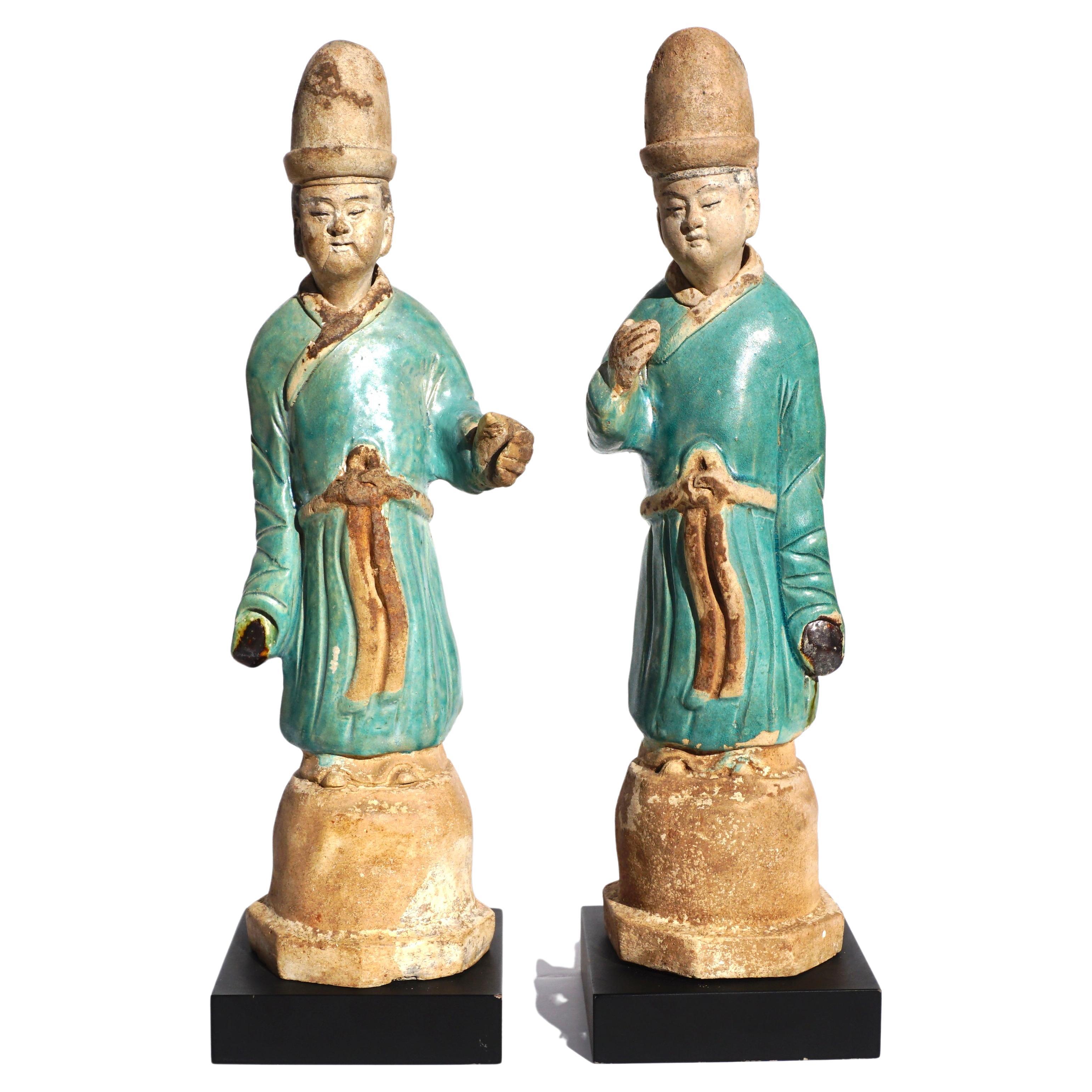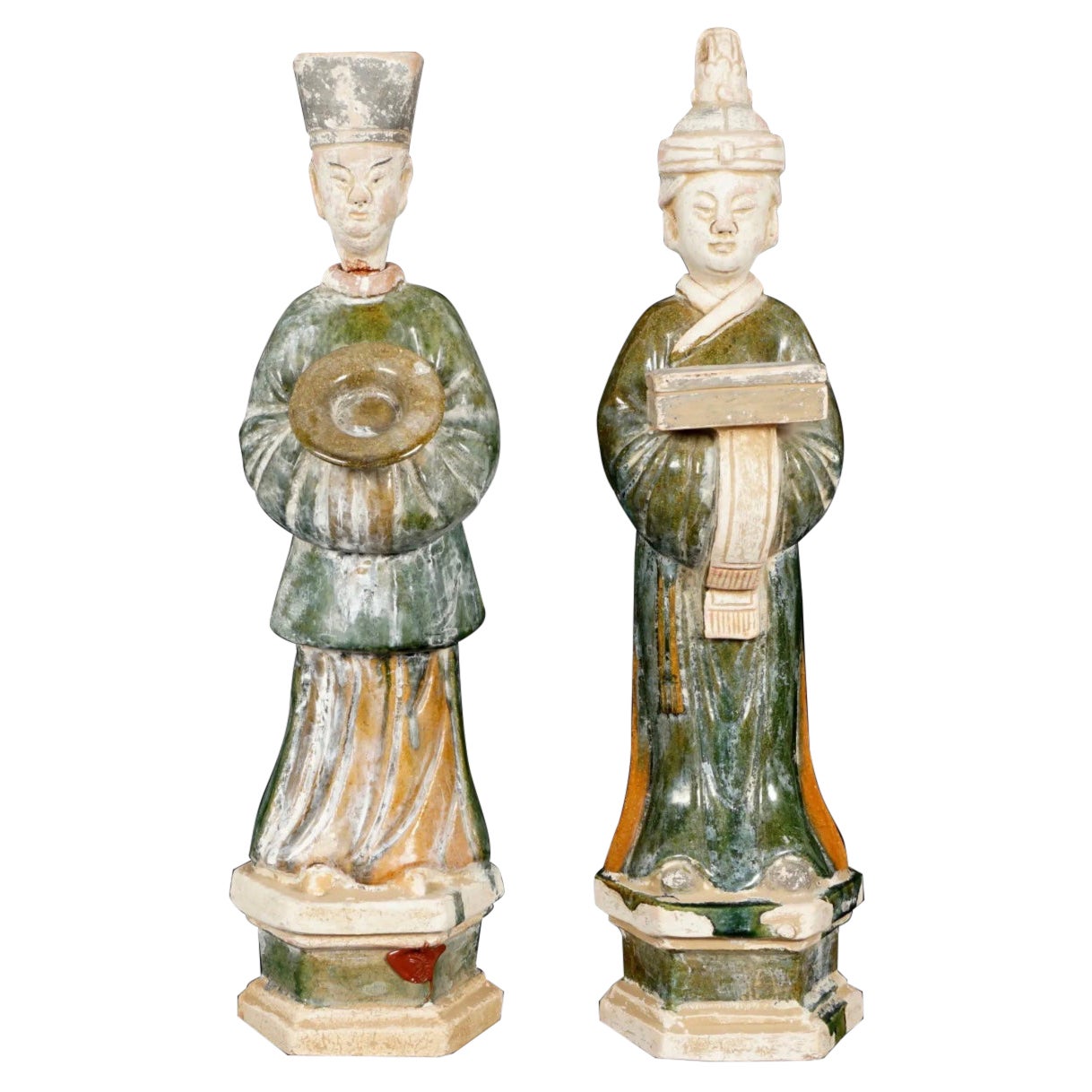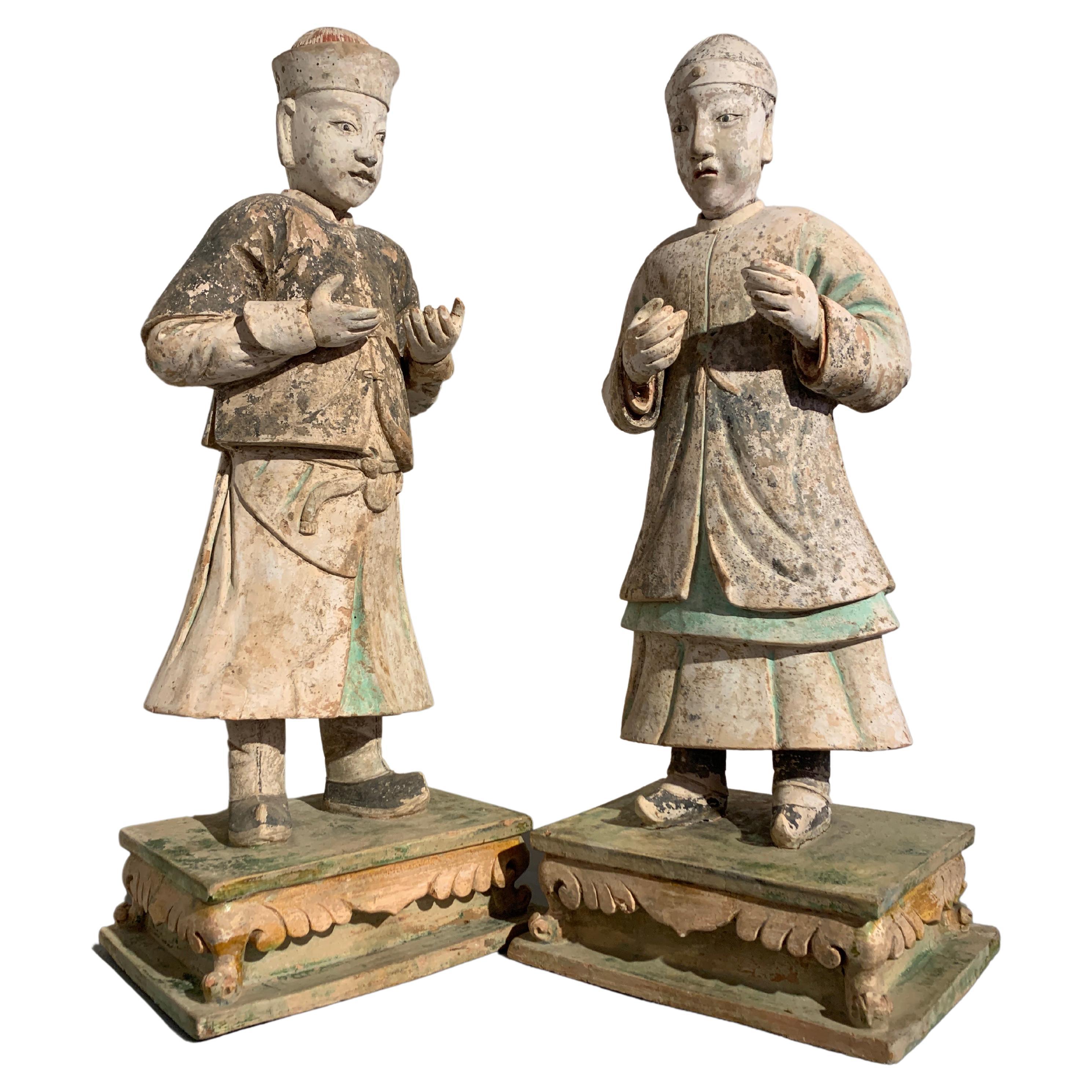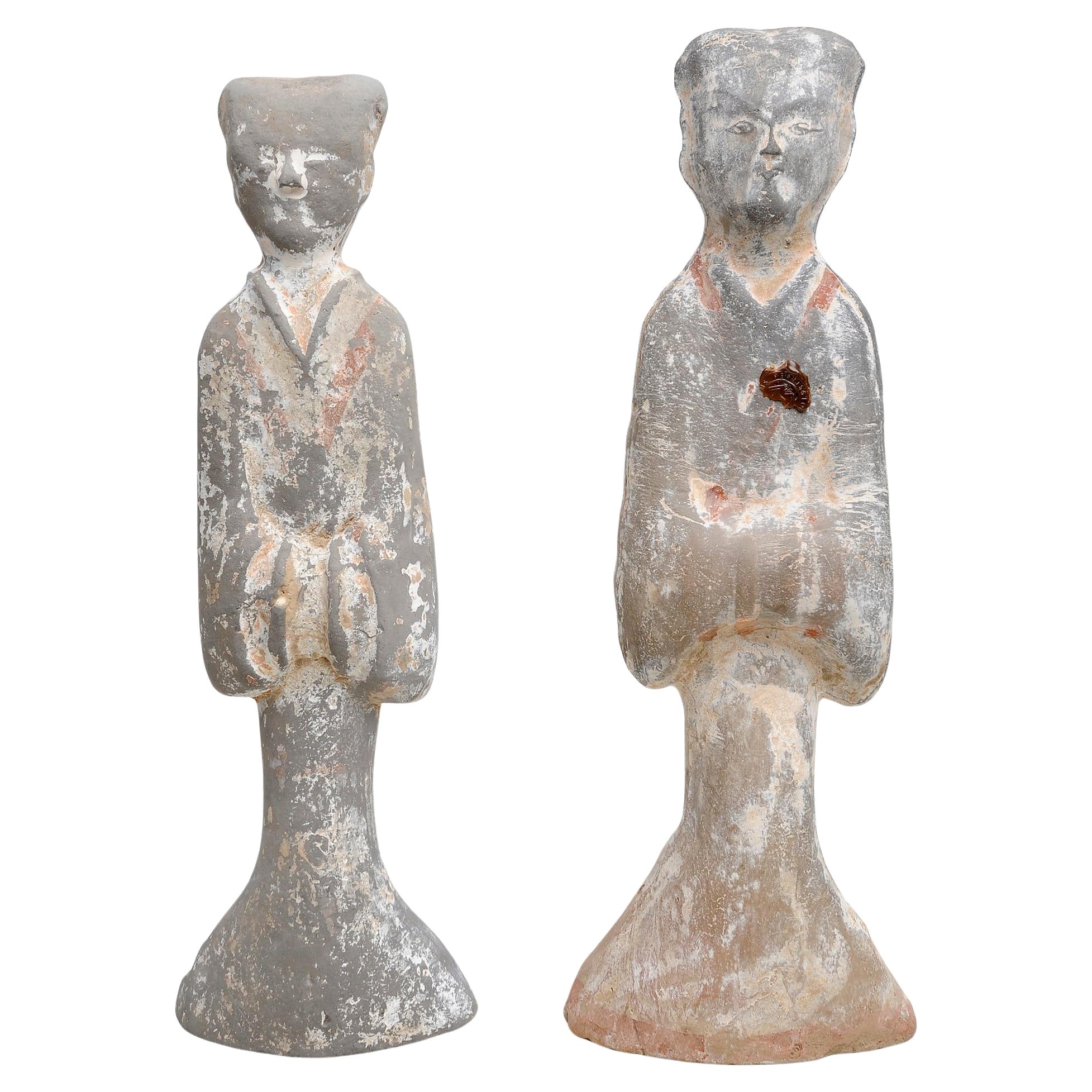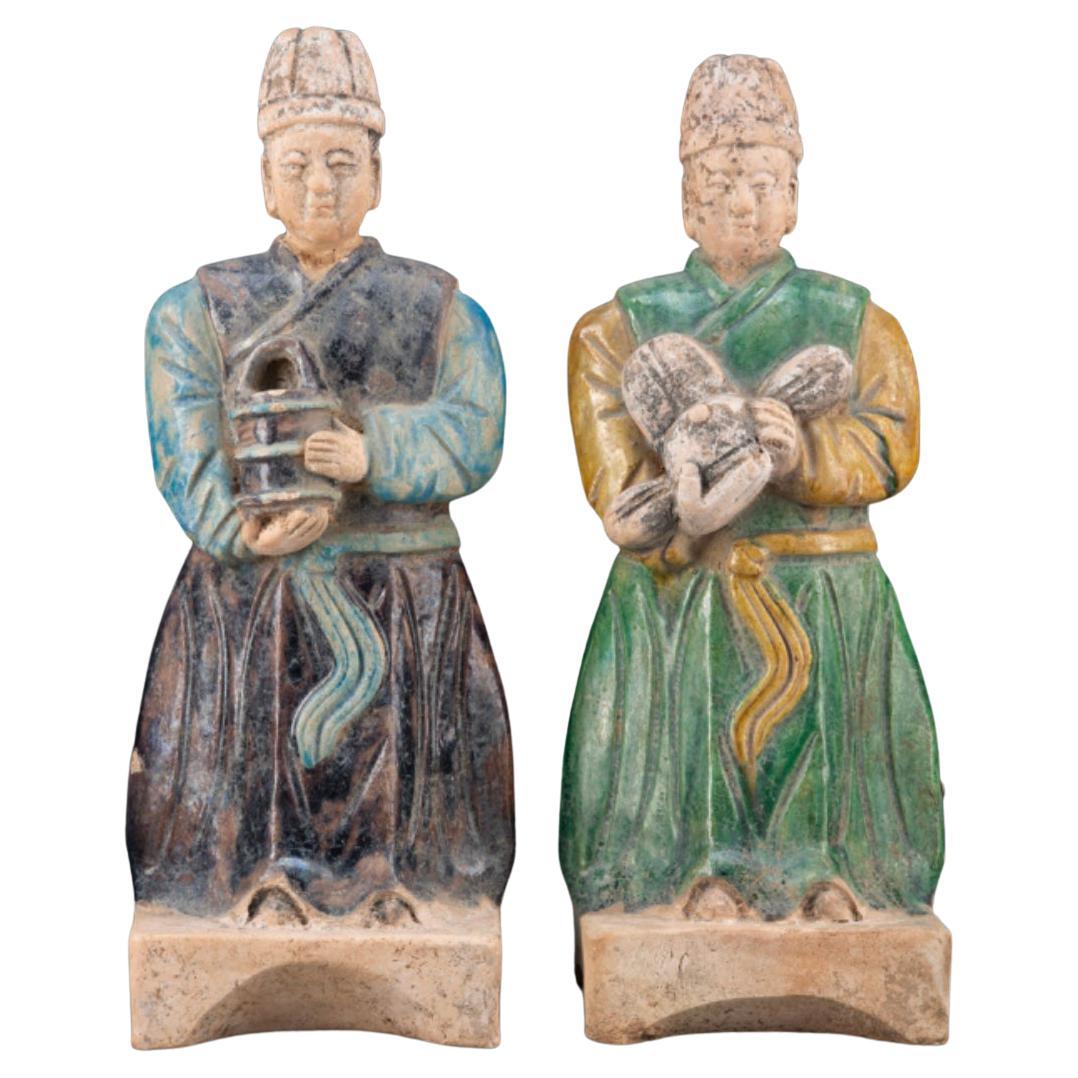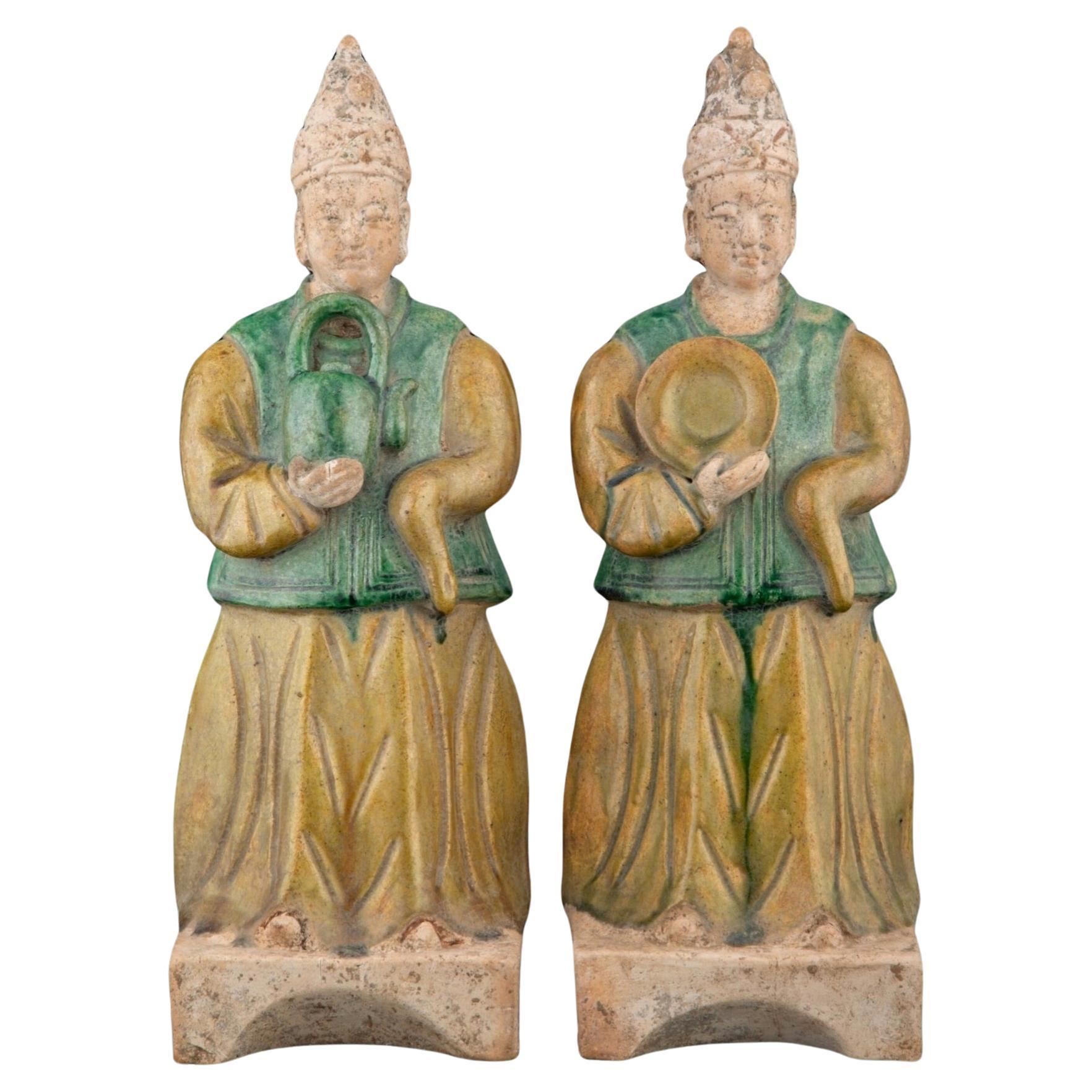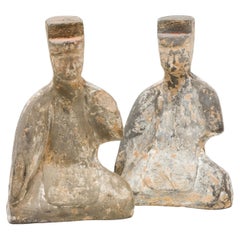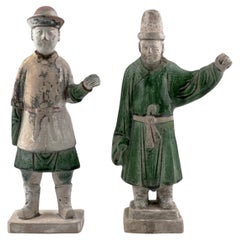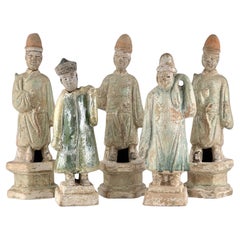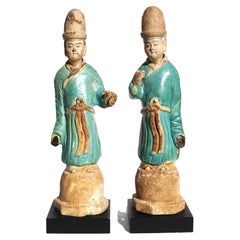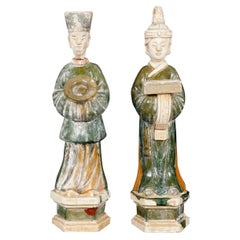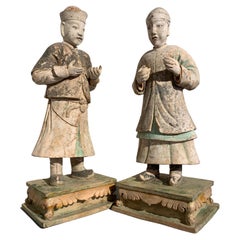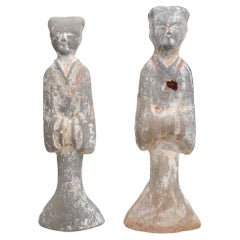Items Similar to Two Straw-Glazed Pottery Figures of Court Male and Female, Sui-Tang dynasty
Want more images or videos?
Request additional images or videos from the seller
1 of 11
Two Straw-Glazed Pottery Figures of Court Male and Female, Sui-Tang dynasty
$1,400per set
$2,000per set30% Off
£1,070.37per set
£1,529.11per set30% Off
€1,232.86per set
€1,761.22per set30% Off
CA$1,961.83per set
CA$2,802.61per set30% Off
A$2,190.20per set
A$3,128.85per set30% Off
CHF 1,147.63per set
CHF 1,639.47per set30% Off
MX$26,810.17per set
MX$38,300.25per set30% Off
NOK 14,574.92per set
NOK 20,821.32per set30% Off
SEK 13,742.30per set
SEK 19,631.86per set30% Off
DKK 9,200.93per set
DKK 13,144.18per set30% Off
About the Item
This pair of straw-glazed pottery figures represents a male and female court attendant, both elegantly attired in period fashion. The female figure wears a flowing robe with draped folds and a high-stylized coiffure, while the male figure dons a long robe and a tall, pointed headdress, suggesting official status. Their serene expressions and poised stances reflect the refined aesthetics of the Sui-Tang period. The straw glaze gives a warm, translucent yellowish tone, with the male figure exhibiting a fine craquelure pattern due to age. Despite minor surface wear, cracks, both figures remain well-preserved, exemplifying the craftsmanship of tomb figurines from this era.
Date : Sui-Tang Dynasty
Type : Straw-glazed pottery figure
Dimension : Female - 27cm (Height) x 9cm (Diameter) / male - 27cm (Height) x 7cm (Diameter)
Condition : Good
Provenance : Acquired in late 1990s from Hongkong
Reference :
1) ROM - Object number: 923.24.101 - Burial figure of a female attendant
(Type : Closely related)
2) Christies Paris 28 NOV – 13 DEC 2024 - A STRAW-GLAZED POTTERY FIGURE OF A COURT LADY - Lot 687
(Price realised : EUR 1,638 / Type : Closely related)
* Sui-Tang Dynasty Straw-glazed Earthenware (581–907 CE)
Straw-glazed earthenware from the Sui and Tang dynasties (581–907 CE) is characterized by a pale yellow, off-white, or greenish glaze fired at a low temperature. This type of glaze, known as straw glaze, contains minimal iron content, resulting in a soft, natural hue with a subtle sheen rather than a glossy surface. It was commonly used for mingqi (明器)—funerary objects placed in tombs—as well as for practical vessels.
During this period, the influence of foreign cultures through the Silk Road is evident in the design of straw-glazed ceramics, particularly in figurines representing warriors, attendants, and animals. These pieces reflect the cosmopolitan nature of the Tang Dynasty, incorporating elements of Central Asian and nomadic attire. As tomb objects, they symbolized the deceased’s status and authority in the afterlife.
While technically simpler than Tang Sancai (唐三彩, three-colored ware), straw-glazed ceramics exhibit elegant curves and refined craftsmanship, making them an important representation of the artistic sophistication of the era.
- Dimensions:Height: 10.63 in (27 cm)Diameter: 3.55 in (9 cm)
- Sold As:Set of 2
- Style:Tang (Of the Period)
- Materials and Techniques:
- Place of Origin:
- Period:
- Date of Manufacture:581–907 CE
- Condition:Minor fading. minor cracks on surface.
- Seller Location:seoul, KR
- Reference Number:1stDibs: LU9577243556592
About the Seller
4.8
Gold Seller
Premium sellers maintaining a 4.3+ rating and 24-hour response times
Established in 1999
1stDibs seller since 2023
38 sales on 1stDibs
Typical response time: <1 hour
- ShippingRetrieving quote...Shipping from: seoul, Korea South
- Return Policy
Authenticity Guarantee
In the unlikely event there’s an issue with an item’s authenticity, contact us within 1 year for a full refund. DetailsMoney-Back Guarantee
If your item is not as described, is damaged in transit, or does not arrive, contact us within 7 days for a full refund. Details24-Hour Cancellation
You have a 24-hour grace period in which to reconsider your purchase, with no questions asked.Vetted Professional Sellers
Our world-class sellers must adhere to strict standards for service and quality, maintaining the integrity of our listings.Price-Match Guarantee
If you find that a seller listed the same item for a lower price elsewhere, we’ll match it.Trusted Global Delivery
Our best-in-class carrier network provides specialized shipping options worldwide, including custom delivery.More From This Seller
View AllTwo Pottery Kneeling Figures of Attendant, Han dynasty
Located in seoul, KR
The statuette shows traces of the original red, black, and white pigmentation. Ceramic statuette from the han Dynasty, depicting two court people, probably a musician. They are dress...
Category
Antique 15th Century and Earlier Hong Kong Han Antiquities
Materials
Pottery
$1,937 Sale Price / set
35% Off
Two Glazed Court Attendants, Ming Period (1368-1644)
Located in seoul, KR
Two finely hollow-moulded terracotta statuettes from ancient China, dating to the Ming Dynasty. The figure is depicted standing, dressed in long, flowing robes, painted in vibrant blue or green and deep amber yellow. The hair is styled into an elaborate top-knot, painted in a muted brown. Areas left unpainted would have been 'cold-painted' after firing, contrasting with the vivid fired blue or green and amber pigments. The figure is shown with the left hand raised to the chest, as if holding something, possibly an offering or incense. Figurines like this were placed in tombs to guide the deceased on their journey to the afterlife.
The Ming Dynasty was known for its exceptional artistic achievements, partly due to its economic prosperity. Since the Han Dynasty, it was customary to bury terracotta miniatures of everyday objects with the deceased. These items, known as mingqi, or "spirit utensils" and "vessels for ghosts," were believed to help and assist the deceased in the afterlife. Mingqi were crafted in the form of cooking utensils, miniature replicas of houses, temples, furniture, and other items. Anthropomorphic and zoomorphic terracotta figures were also popular, designed to assist, entertain, and recreate the living world for the deceased.
Period: Ming Dynasty
Medium: Green/blue-glazed Pottery
Type: Figure
Provenance : Acquired in late 1990s from Hongkong
Reference :
1) Ancient & Oriental - Terracotta Tomb Attendants
(Type : Highly related)
2) La Maison De La Petite Sara S.r.l. - Archaeology section - A Black glazed Terracotta Statuette, Servant with Trumpet, Ming Dynasty
(Price realised : 700 GBP / Type : Highly related)
* Ming Dynasty Glazed Pottery Figures
Ming Dynasty glazed pottery figures are renowned for their bold color palette, intricate detailing, and lifelike forms, distinguishing them from earlier traditions. These figures, which depict officials, warriors, animals, and mythical creatures, are characterized by high-gloss lead-based glazes in green, amber, ochre, and sancai (three-color) combinations. The thickly applied glaze pools in recesses, creating depth and enhancing sculptural details. With dynamic postures, expressive facial features, and meticulously rendered drapery, these figures reflect the period’s advancement in ceramic craftsmanship, offering a greater sense of movement and realism compared to the rigid and stylized forms of earlier dynasties.
A defining characteristic of Ming glazed pottery is its elaborate surface detailing, often achieved through raised relief elements and contrasting glazes. Equestrian figures, for example, feature carefully sculpted saddles, harnesses, and decorative embellishments, while human figures are adorned with intricate robes and headdresses. The large scale of these tomb figures, often more imposing than those from previous periods, underscores the increasing importance of funerary art during the Ming era. Unlike later Qing Dynasty figures...
Category
Antique 15th Century and Earlier Hong Kong Ming Antiquities
Materials
Pottery
$1,943 Sale Price / set
35% Off
Two Figures of Attendants, Ming Period(1368-1644)
Located in seoul, KR
Statues of attendants crafted from terracotta, featuring glazes in green, Set on rectangular bases.
Period: Ming Dynasty
Medium: Glazed Pottery
Type: Figure
Condition : Excellent(It has soil on it, which is presumed to be evidence of excavation)
Provenance : Acquired in late 1990s from Hongkong
Reference :
1) Indianapolis Museum of Art - Dinastia ming, figure maschili, 1368-1644
(Type : Closely related)
2) V&A Museum - Accession number FE.295:1, 2-2005
(Type : Closely related)
3) Sotheby's 01 May 2007 - The Collection Of Paul Otto Taubert & Jewellery And Decorative Arts - Lot 233
(Price range : 5,000 - 7,000 AUD / Type : Closely related)
4) Asian Art Museum, San Francisco - Object number B60P1631 - Standing Man Tomb Figure
* Ming Dynasty Glazed Pottery Figures
Ming Dynasty glazed pottery figures are renowned for their bold color palette, intricate detailing, and lifelike forms, distinguishing them from earlier traditions. These figures, which depict officials, warriors, animals, and mythical creatures, are characterized by high-gloss lead-based glazes in green, amber, ochre, and sancai (three-color) combinations. The thickly applied glaze pools in recesses, creating depth and enhancing sculptural details. With dynamic postures, expressive facial features, and meticulously rendered drapery, these figures reflect the period’s advancement in ceramic craftsmanship, offering a greater sense of movement and realism compared to the rigid and stylized forms of earlier dynasties.
A defining characteristic of Ming glazed pottery is its elaborate surface detailing, often achieved through raised relief elements and contrasting glazes. Equestrian figures, for example, feature carefully sculpted saddles, harnesses, and decorative embellishments, while human figures are adorned with intricate robes and headdresses. The large scale of these tomb figures, often more imposing than those from previous periods, underscores the increasing importance of funerary art during the Ming era. Unlike later Qing Dynasty figures...
Category
Antique 15th Century and Earlier Hong Kong Ming Antiquities
Materials
Pottery
$1,820 Sale Price
35% Off
Five Green Glazed Pottery Attendant Figures, Ming Dynasty(1368-1644)
Located in seoul, KR
The three figurines in the back exhibit the typical form of attendants, wearing conical red hats and adopting poses where their right hands are either held in front of their chests o...
Category
Antique 15th Century and Earlier Hong Kong Ming Antiquities
Materials
Pottery
$2,925 Sale Price / set
35% Off
Two Incised Sandstone Mingqi, Five Dynasties and Ten Kingdoms period(907-979)
Located in seoul, KR
Figures from this era tend to be simpler and more utilitarian, reflecting the instability and regional diversity of the time. These pottery figures often unglazed or painted with bas...
Category
Antique 15th Century and Earlier Hong Kong Antiquities
Materials
Sandstone
$1,176 Sale Price
30% Off
Rare Yue Celadon-Glazed Two Haitai Statues, Western Jin dynasty (265-420)
Located in seoul, KR
The statue seems to be a mythical beast standing in a poised and alert stance, with its mouth open as if roaring or breathing fire. Its body is covered in detailed carvings that resemble scales and feathers, indicative of the high level of craftsmanship during the Jin Dynasty. The creature’s presence is both regal and intimidating, suggesting it might have been believed to possess protective properties.
Period : Western Jin Dynasty (266 - 316 AD)
Type : Haitai Statue
Medium : Yue celadon...
Category
Antique 15th Century and Earlier Hong Kong Chinese Export Antiquities
Materials
Celadon
$8,970 Sale Price / set
70% Off
You May Also Like
Pair Ming Dynasty Glazed Pottery Dignitary Figures
Located in Dallas, TX
A pair of Ming dynasty sancai blue glazed pottery figures.
Circa 1500 AD Ming Dynasty
I have owned over 250 ming tomb figures including over 80...
Category
Antique 16th Century Chinese Ming Figurative Sculptures
Materials
Pottery
Two Ming Style Chinese Pottery Dignitaries
Located in Bradenton, FL
Two Chinese Ming style sancai polychrome glaze terracotta pottery figures of Chinese dignitaries in glazed green and ocher terracotta on hexagonal bases and removable heads. The man ...
Category
20th Century Chinese Chinese Export Figurative Sculptures
Materials
Pottery
Pair Large Chinese Ming Dynasty Glazed and Painted Pottery Figures, 16th Century
Located in Austin, TX
A striking pair of large Chinese glazed and painted pottery figures, Ming Dynasty (1368 to 1644), circa 16th century, China.
The impressive and realistically modeled figures each portrayed standing upright upon a sancai (three color) glazed pedestal of kang table form.
The man is dressed in a short black surcoat over a long robe and pants, a smart cap upon his head. His face is warm and welcoming, with wide eyes and a slight smile on his lips. He holds his hands out in front of him, palms up, almost as if shrugging, though presumably originally holding an object or offering, now lost.
The woman of slightly smaller stature, and dressed in a longer surcoat over a long robe and skirt. She wears a fitted cap upon her head. Her hands also held out in front, grasping long lost objects. Her face is slightly more severe, with a somewhat pinched look, and slight frown upon her lips.
The size of these figures is remarkable, as is the realism and attention to detail, almost as if they were modeled after real people, as opposed to the more common and generic Ming Dynasty pottery...
Category
Antique 16th Century Chinese Ming Sculptures and Carvings
Materials
Pottery
Antique Terracotta Chinese Figures Statues
Located in Alessandria, Piemonte
Antique terracotta figures Han style from my private collection: collected about 35 years ago and never exibited to the public.
One is very ancient, the other one is more recent. The prices are different, but an expert can understand the value. A certificate Oxford test would be needed: I don't have it, so I'm accepting offers: I want to close my activities and I have a beautiful Chinese collection, see the other ones published under my name enrica pasino.
Category
Antique 15th Century and Earlier Chinese Han Antiquities
Materials
Terracotta
$5,907 / set
Chinese Ming Dynasty Glazed Pottery Attendants
Located in Dallas, TX
A pair of Chinese Ming Dynasty glazed earthenware figure of Attendant
The condition of these 5 century old glazed pottery tomb figures is outstand...
Category
Antique 16th Century Chinese Ming Figurative Sculptures
Materials
Pottery
Chinese Ming Dynasty Antique Sancai Glazed Attendants Tomb Figure Pair
Located in Forney, TX
A pair of large antique Chinese polychrome ceramic attendants, Ming Dynasty (1368-1644).
Outstanding 500+ year old Sancai glazed earthenware pottery tomb figures, exceptionally executed figural form, exquisitely detailed, one holding a teapot, the other holding a charger, rising on rare sculptural plinth...
Category
Antique 15th Century and Earlier Chinese Ming Sculptures and Carvings
Materials
Ceramic, Earthenware
